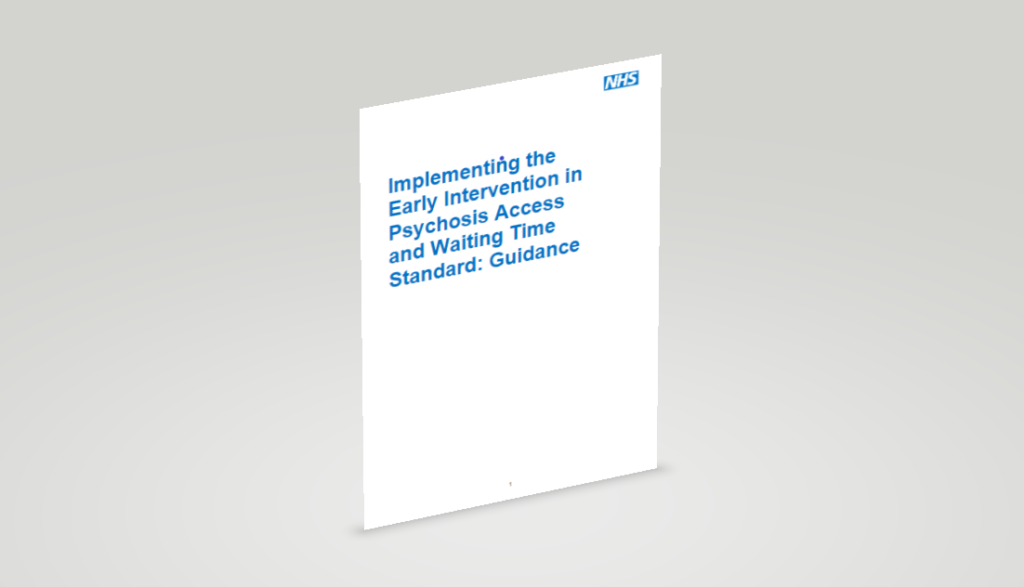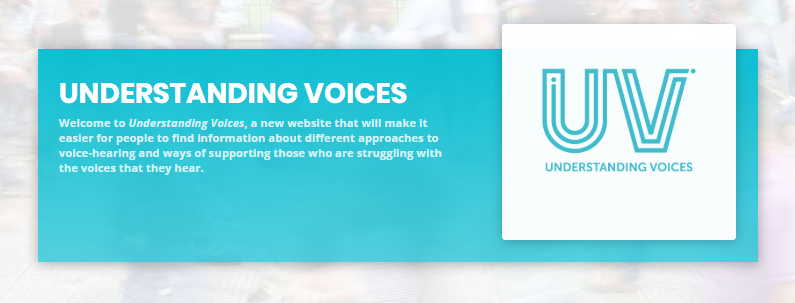



The long awaited refresh of national guidelines for Early Intervention in Psychosis were published in December. Delayed by the pandemic, these new guidelines represent a synthesis of the experience gained in the five years since the original guidelines best price propecia were produced and a blueprint for the continued development of the specialism.
The guidelines reflect the NHS Long-Term Plan objective for 95% of teams to be rated as ‘Performing Well’ (NCAP Level 3) by April 2024. With increased contributions from service users and carers, the guidelines emphasise the 14-65 age range and promote the latest version of the Psymaptic psychosis prediction tool for estimating local incidence.
The 2020 update includes updated and expanded sections covering models of care, workforce, carer education, children and young people. And, for the first time ever, national commissioning guidance for the design and implementation of At Risk Mental States (ARMS) pathways is provided.
In his foreword to the latest edition, Tim Kendall, national clinical director for mental health, acknowledges that much progress has been made in a relatively short time and thanks EIP services for all their incredible work and dedication. With some areas still needing considerable support to achieve Level 3, and many needing to introduce ARMS pathways and improve their CYP offer, the new guidelines are a welcome reminder of the important part EIP has to play in the transformation of mental health services.

The National Institute for Clinical Excellence in England (NICE) has recently published guidance on rehabilitation for adults with complex psychosis. The new guidance is of relevance to those people who attain only a limited recovery from psychosis related symptoms and functional impairments, despite the best efforts of EIP services. For this group a seamless ongoing pathway to effective rehabilitation services can help optimise their long-term recovery.
Follow this link to read Paul French’s IEPA blog on why rehabilitation is relevant to EIP services.
See our Policy & Practice section for more
The health secretary’s announcement that the restoration of mental health services is to be prioritised post lockdown is very welcome and Simon Steven’s letter to the NHS has highlighted the importance of proactively supporting mental health service users and the need to prepare for an increase in demand as a consequence of the pandemic. Boris has told us to get on our bikes and get back to work, and the shops and pubs are re-opening, but not surprisingly, after weeks of being told that going out of our houses would lead to almost certain death, there has been some reluctance to return immediately to work and behaviours that risk transmission of the virus. Like teachers, front line mental health workers will need a lot of support to fully re-commence direct care and interventions given current levels of health anxiety.
After months of lockdown, during which specialist care and treatment for people with first episode psychosis (FEP) has been unavoidably curtailed, the impact is starting to be seen. Whilst few specialist Early Intervention in Psychosis (EIP) teams have been pooled into generic community teams as feared, most have been sharing staff with inpatient wards and other vital teams, attempting to deliver care remotely and preparing for worst case scenarios. Therapies that require face-to-face contact have been impacted and physical health checks paused. Teams have endeavoured to support relapsing patients, using PPE for community visits, but the regular and persistent contact that typifies the EIP approach has been significantly reduced. Many report getting less referrals from primary care, doing fewer new assessments and seeing more people coming through acute pathways, including hospital admissions.
EIP teams have naturally needed to focus on those with greatest need at the height of the pandemic but, as things stabilise, our ambition should be rapid and complete restoration of the full model. After years of developing and implementing new standards of care for people with FEP – standards of care based on strong evidence for effectiveness and recovery from this serious illness – we know how important what we do is. But we will need innovative and creative strategies and a safe, well supported workforce to reinstate all of the components of the approach.
During the outbreak we have quickly learned how to deliver interventions remotely and have amended treatment protocols for new ways of working; successfully utilising new digital technologies and social media platforms. Some of this learning will become valuable new ways of working and has the potential to substantially improve efficiency in the future. But we also need to recognise that sometimes only face-to-face will do. New assessments, assertive engagement, initiating therapy and physical health checks can’t really be done on WhatsApp. In addition, we are recognising that inequalities in healthcare are a major factor during this pandemic. Not a new thing, but we need to be wary that we don’t contribute to those inequalities by providing access to care for only those people who are capable of and willing to engage in online interventions.
Performance management of the waiting time standard has been paused during the outbreak and contracting decisions are currently on hold, with planned service developments uncertain now in some places. It’s undecided whether this year’s national quality audit (NCAP) will go ahead as usual. Not surprisingly, many have expressed a desire to postpone or delay this autumn’s audit.
At the start of the outbreak, when we feared significant staff losses, this was a very understandable reaction. As we start to plan for our ‘new normal’ there remains concern that that the impact of the pandemic on the quality of our services will render the audit pointless.
Completing the audit takes many hours of work and critics have highlighted problems with narrow focus, inconsistent interpretation of the standards, gaming and long delays in publishing the results. Despite such shortcomings, however, we have for the first time a measure of quality that includes the first ever waiting time standard in mental health; that focuses on research based, NICE approved clinical interventions and that promotes the collection of outcome data.
Undoubtedly the audit will capture the impact of the pandemic this year, but continuing to do it sends out a strong message about EIPs commitment to quality and the need to continue to develop and improve our clinically effective, cost effective and morally grounded model, even in the hardest of times. Doing the audit this year sends out a powerful signal that Early Intervention in Psychosis remains an important priority for the NHS.
Recovery and restoration won’t be instant and there remains much to do and learn if we are to re-establish the entire EIP offer in a safe and sustainable way whilst this virus still threatens us. But postponing or diminishing this year’s audit would be a massive own goal – sending out the message that the quality of our services is some kind of first world luxury that ceases to matter in a crisis. The truth is that high quality mental healthcare will be more important than ever in the aftermath of the pandemic and for a treatment model that has been shown to be so effective, the sooner we can recover and restore the better.
The innovation and determination demonstrated by EIP teams during the outbreak means that people with first episode psychosis have been well supported despite all the limitations of the social distancing regime. The time has now come to raise our game back to pre-pandemic levels – and to brace ourselves to do the NCAP audit, whatever it shows.
To help EI teams adjust to the impact of the pandemic we have been gathering together policies, protocols and good practice that have been developed to support the maintenance of safe and effective services during the crisis. Please see the new COVID-19 section for national guidance and local example documents shared by EIP colleagues. We hope this will help you adapt quickly to these new challenges and help you to provide the best care possible during this extraordinary period.
By Ann and David Shiers, 20th April 2020
Now in her 40s, our daughter enjoys life and is supported in an excellent residential care home. However she experiences severe psychological impairments, due to a combination of schizophrenia and learning disability. She requires support with all aspects of her life.

What if our daughter couldn’t complete her routine blood count? Maybe she’s had to self-isolate? Maybe the system had a temporary glitch? But whatever the cause, an absent ‘green’ blood test could result in our daughter’s clozapine being withheld.
Current product licensing rules. Because she has been on clozapine without evidence of suppressed white cell counts for more than 12 months then the current product licence permits a two-week extension. Beyond that, the prescribing doctor must take responsibility for prescribing outside the manufacturer’s product licence.
Are we reassured by the offer of blood sampling being taken in her residential home? NO! Would she accept a stranger in gown and mask coming to her home to take blood? It’s right OUTSIDE HER ROUTINE and she would almost certainly REFUSE.
Here’s what scares us. Vivid and painful memories of three years of incarceration in hospital following onset of psychosis in late teens. Drug after drug tried. Rock bottom. Nothing helped until clozapine was commenced. And now:
⦁ 23 years on clozapine without a single unsatisfactory routine blood test.
⦁ 23 years without a relapse of her psychosis
⦁ 23 years clawing back a life worth living
A balance of risks. Sacrificing 23 years of stability on clozapine and the horrendous risk of a relapse into hospital and then god knows what that might lead to in the longer term. All because Covid-19 indirectly impeded routine blood testing.
Concerns from families like ours are being recognised. Take a look at the latest advice on clozapine from some notable national authorities:
⦁ Maudsley guidance on Covid-19 and clozapine
⦁ Rethink – Coronavirus and Clozapine
⦁ NHS Specialist Pharmacy Service – Clozapine monitoring during Covid-19
We shared our concerns with a psychiatrist friend. His view was “Where there’s a will there’s a way. With a flexible, collaborative and personalised approach involving patient, carers, clinicians & pharmacists I would be optimistic that this risk can be successfully navigated to ensure continuity of treatment”.
How does your service balance this clozapine and Covid-19 risk in these strange and worrying times?
from Tees, Esk and Wear Valleys NHS Foundation Trust
These unprecedented times will put an inordinate strain on our services, which has led to the publication of helpful advice from NHS England on prioritising our mental health services. Of course it is vital to re-evaluate what is important and ensure that unnecessary activities are minimised in order to direct scarce staff resources to the point of greatest need.
For some time, EIP services were considered luxury services with high staffing levels, low caseloads and highly skilled practitioners. At times like this it may be tempting to think that EIP teams would be an easy place to look for staff to supplement other activities.
EI staff can certainly play their part in supporting the wider system during this crisis. They have skills in managing complex needs in the community, positive risk management and their physical health strengths can be called upon. However, it is important to recall the rationale for EIP. These teams were established to support some of the most vulnerable people within our mental health system. They provide the individual and their family with the most evidence based interventions to optimise recovery and minimise the chances of relapse and the associated difficulties that a relapse would bring.
We know that a relapse from a psychotic illness has not only a profound impact on the individual but also the family and wider support system. A relapse could lead to the involvement of a wide number of health and social care staff as well as family and friends who may be affected by the impact of an acute psychotic episode.
Therefore, especially in the current climate, one of the most important things we could do in mental health would be to prevent relapse and thereby minimise this impact on family and friends and on the health, social care and criminal justice systems. EIP is one of the most evidenced systems of care to achieve this and as such should be prioritised alongside other essential services such as crisis teams.
Although it may be hard to sustain, it’s important to recognise that guidelines are clear on the interventions and approaches that achieve good outcomes, and the closer teams can remain aligned to these guidelines, the more likely they are to achieve them. EIP teams will need to focus on those with greatest need, utilise new technological strategies to deliver interventions and amend treatment protocols during the outbreak. But, similar to the daily reminder from our scientists about the best way to overcome the coronavirus, please remember the science and the evidence for what works.
From a mental health perspective, if we are to achieve social distancing, without increasing strain on crisis pathways, inpatient beds and the acute sector, EIP should be seen as a vital tool. It should not be considered a luxury that can’t be justified in difficult times, but a vital service model that needs to be prioritised and sustained.
Paul French
As we approach the final year of the Five Year Forward View programme (5YFV) the NHS has confirmed funding for Early Intervention in Psychosis (EIP) teams in 2020/21. This is now an extra £52million for CCGs to invest in their local EIP teams to what is currently invested.
This announcement is very encouraging – and there are exacting performance requirements attached to this investment: The 5YFV for Mental Health requires us to develop EIP teams to a new national standard and ensure access to NICE approved treatment within 14 days of referral.
Good progress is being made in supporting teams to achieve the national quality standard (Level 3- performing well). The target is for 60% of teams to reach this level by 2021. The Long-Term Plan has now clarified the objectives for EIP beyond this date. By 2024 all teams in England are required to reach level 3. Furthermore, the NHS has reiterated the requirement for EIP to provide a service to people presenting with At-Risk Mental States and to support the full 14-65 age group.
One of the criticisms levelled at the NHS historically is that investment intended for EIP has not reached the intended teams. Distributing this money through CCG baseline funding at a time of austerity for public services has inevitably led to problems.
Commissioners and providers will be held to account for how they have spent their share of this vital new investment and will need to report to NHS England on their plans for investment in EIP and the money they have spent.
NHS England has produced a ‘Mental Health LTP analytical tool’ which enables CCG and STP level indicative investment to be calculated. For access to this tool contact your NHS England regional mental health lead.
Links:
NHS Mental Health Implementation Plan 2019/20 – 2023/24
Understanding Voices is a new website that aims to make it easier for people to find information about different approaches to voice-hearing and ways of supporting those who are struggling with the voices that they hear.
It has been produced by Hearing the Voice, a large interdisciplinary study of voice-hearing based at Durham University and funded by the Wellcome Trust. The website was developed in close collaboration with voice-hearers, their families and allies, and mental health professionals.
The website covers a wide variety of topics, ranging from what it is like to hear voices and what’s happening in the brain, through to the pros and cons of medication, cognitive behavioural therapy and peer support. It presents practical techniques for managing distressing voices, information for families and friends, and also sheds light on the links between voice-hearing and inner speech, trauma, creativity and spiritual or religious experiences.

https://understandingvoices.com/

This August, three groups of EIP service users and support staff from across Wales are sailing the tall ship Faramir around the Irish Sea in relay over three weeks. They will be taking in the whole coast of Wales, as well as Northern Ireland and the Isle of Man, finishing in Cardiff Bay.
Next year the ambition is to extend the voyage to a circumnavigation of the UK and there is a chance to get involved!
The voyage is an experiment in adventure therapy, to support young people and their mental health. It aims to address factors which keep people stuck in their life situation – and in services – by providing a radically different environment in which to develop confidence, new skills, engage in physical activity and explore a fresh perspective on life.
Faramir is a fast sailing yacht, purpose built for sail training. Sailing long distances in her involves physical effort and teamwork, learning how to navigate as well as cooking, cleaning and everyday boat maintenance. Learning key skills for life!
‘Committing to an adventure on this scale is both a bold and daunting decision for all involved’ says Dr Mike Jackson, consultant clinical psychologist and EIP lead for the Betsi Cadwaladr University Health Board. ‘Everyone is leaving their comfort zone far behind, to live in close proximity with 17 other people for a week; eating, sleeping and sailing to a strict routine; working in teams to sail the boat; coping with seasickness and disturbed sleep.’
Each of the 12 legs of the voyage will involve 10 young people, with up to five leaders from their local EIP services, and three permanent crew, who will teach the young people to sail the boat themselves. EI staff are on board as group leaders and to provide therapeutic support and interventions.
Teams will need to be able to raise some money to participate – about £5k per team. Mike is currently recruiting teams for each of the 12 legs so f you are interested in taking part and think you can press-gang a crew please get in touch.
Contact:
Also see: https://cirdantrust.org